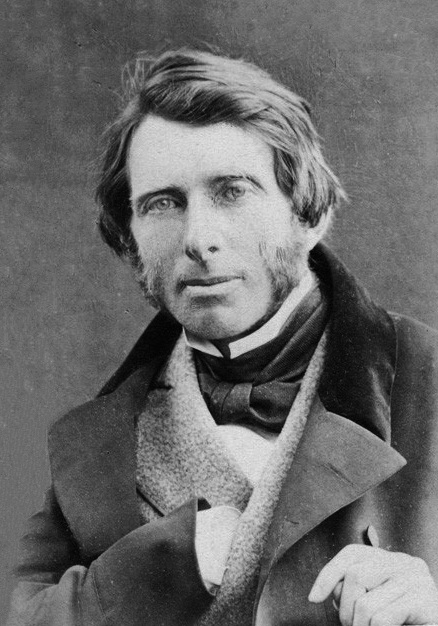architecture is the art which so disposes and adorns the edifices raised by man, for whatsoever uses, that the sight of them may contribute to his mental health, power, and pleasure
The Seven Lamps of Architecture - Página 7 http://books.google.com/books?id=yxscPx9aLM8C&pg=PA7, de John Ruskin - Publicado por Wiley, 1865 - 186 páginas
John Ruskin Frases famosas
“Acho que a primeira prova da grandeza de um homem é a sua humildade.”
I believe the first test of a truly great man is his humility
The True and the Beautiful in Nature, Art, Morals, and Religion - Página 338 http://books.google.com/books?id=zz5LAAAAMAAJ&pg=PA338, de John Ruskin, L. C. Tuthill - Publicado por John Wiley & Son, 1867 - 452 páginas

Citações de homens de John Ruskin
Variante: A maior recompensa para o trabalho do homem não é o que se ganha, mas o que ele nos torna.
In health of mind and body, men should see with their own eyes, hear and speak without trumpets, walk on their feet, not on wheels, and work and war with their arms, not with engine-beams
The Works of John Ruskin: Praeterita. 1886-87 - Volume 22 - Página 367, John Ruskin - Allen,1887
John Ruskin frases e citações
Variante: Dificilmente existirá alguma coisa neste mundo que alguém não possa fazer um pouco pior e vender um pouco mais barato. E as pessoas que consideram o preço somente, serão suas merecidas vítimas.
“A esperança deixa de ser felicidade quando acompanhada de impaciência.”
Hope herself ceases to be happiness when impatience companions her.
The Ethics of the Dust: Ten Lectures to Little Housewives on the Elements of Crystallisation, página 61 https://books.google.com.br/books?id=pzlcAAAAcAAJ&pg=PA61, John Ruskin - John Wiley & Son, 1866 - 250 páginas
Variante: A própria esperança deixa de ser ventura quando a impaciência a acompanha.
John Ruskin: Frases em inglês
Also misattributed to John Steinbeck.
Fonte: The Works of John Ruskin: The stones of Venice, v. 1-3
“When love and skill work together, expect a masterpiece.”
Widely attributed on the Internet to John Ruskin; see this Google search https://www.google.com/search?num=50&q=%2B%22When+love+and+skill+work+together%2C+expect+a+masterpiece.%22+%2B%22John+Ruskin%22+-%22Charles+Reade%22&oq=%2B%22When+love+and+skill+work+together%2C+expect+a+masterpiece.%22+%2B%22John+Ruskin%22+-%22Charles+Reade%22&gs_l=serp.12...143064.148395.0.150598.2.2.0.0.0.0.108.196.1j1.2.0....0...1c.1.64.serp..0.0.0.JURsIFvRl34 for thousands of pages containing the quote AND "John Ruskin" but NOT "Charles Reade".
This is actually from Put Yourself in His Place by Charles Reade.
Misattributed
“There is no wealth but life.”
Fonte: The King of the Golden River
A Joy for Ever, note 6 (1857).
Contexto: For certainly it is excellent discipline for an author to feel that he must say all he has to say in the fewest possible words, or his reader is sure to skip them; and in the plainest possible words, or his reader will certainly misunderstand them.
Volume I, chapter II, section 17.
The Stones of Venice (1853)
Variante: Remember that the most beautiful things in the world are the most useless.
Contexto: You were made for enjoyment, and the world was filled with things which you will enjoy, unless you are too proud to be pleased with them, or too grasping to care for what you cannot turn to other account than mere delight. Remember that the most beautiful things in the world are the most useless: peacocks and lilies, for instance.
According to Ruskin scholar George P. Landow, there is no evidence that this quotation or its variants can be found in any of Ruskin's works.
[Landow, George P., A Ruskin Quotation?, VictorianWeb.org, 2007-07-27, http://www.victorianweb.org/authors/ruskin/quotation.html, 2013-01-07]
Disputed
Volume III, part V, chapter II (1856).
Modern Painters (1843-1860)
Fonte: Dictionary of Burning Words of Brilliant Writers (1895), P. 170.
The Work of Iron, in Nature, Art, and Policy http://books.google.com/books?id=uYEM0Sd18DsC&q="you+may+either+win+your+peace+or+buy+it%22+%22win+it+by+resistance+to+evil%22+%22buy+it+by+compromise+with+evil"&pg=PA196#v=onepage Lecture at Tunbridge Wells (February 16, 1858).
Fonte: Dictionary of Burning Words of Brilliant Writers (1895), P. 147.
“When we build, let us think that we build for ever.”
Fonte: The Seven Lamps of Architecture (1849), Chapter VI: The Lamp of Memory, section 10.
Fonte: The Seven Lamps of Architecture (1849), Chapter II: The Lamp of Truth, section 1.
“Of human work none but what is bad can be perfect in its own bad way.”
Volume II, chapter VI, section 24 http://books.google.com/books?id=AwICAAAAYAAJ&q=%22Of+human+work+none+but+what+is+bad+can+be+perfect+in+its+own+bad+way%22&pg=PA189#v=onepage.
The Stones of Venice (1853)
“Of all God's gifts to the sight of man, colour is the holiest, the most divine, the most solemn.”
Volume II, chapter V, section 30.
The Stones of Venice (1853)
Volume II, chapter IV, section 103.
The Stones of Venice (1853)
Sesame and Lilies, lecture II: Lilies http://www.fullbooks.com/Sesame-and-Lilies3.html
Volume III, part IV, chapter XII (1856).
Modern Painters (1843-1860)
Variante: All violent feelings have the same effect. They produce in us a falseness in all our impressions of external things, which I would generally characterize as the pathetic fallacy.
